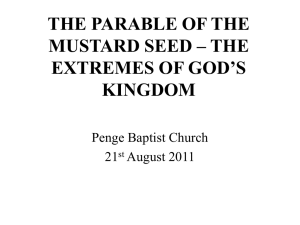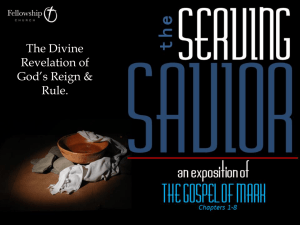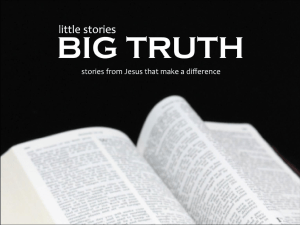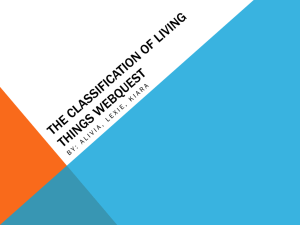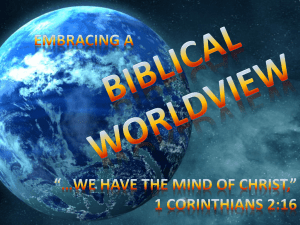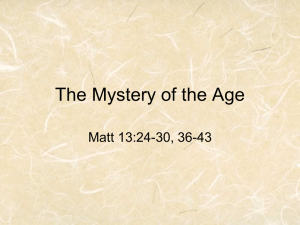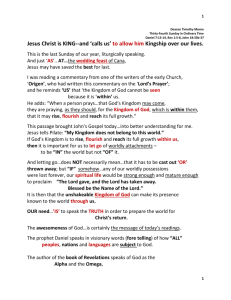The Parable of The Mustard Seed
advertisement
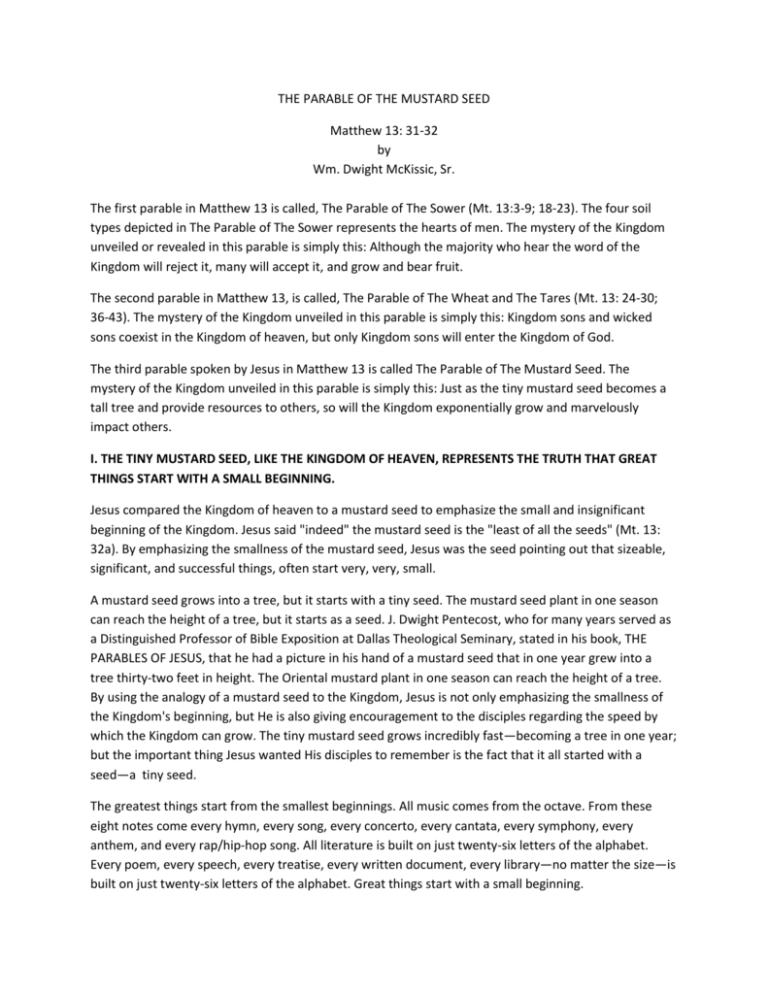
THE PARABLE OF THE MUSTARD SEED Matthew 13: 31-32 by Wm. Dwight McKissic, Sr. The first parable in Matthew 13 is called, The Parable of The Sower (Mt. 13:3-9; 18-23). The four soil types depicted in The Parable of The Sower represents the hearts of men. The mystery of the Kingdom unveiled or revealed in this parable is simply this: Although the majority who hear the word of the Kingdom will reject it, many will accept it, and grow and bear fruit. The second parable in Matthew 13, is called, The Parable of The Wheat and The Tares (Mt. 13: 24-30; 36-43). The mystery of the Kingdom unveiled in this parable is simply this: Kingdom sons and wicked sons coexist in the Kingdom of heaven, but only Kingdom sons will enter the Kingdom of God. The third parable spoken by Jesus in Matthew 13 is called The Parable of The Mustard Seed. The mystery of the Kingdom unveiled in this parable is simply this: Just as the tiny mustard seed becomes a tall tree and provide resources to others, so will the Kingdom exponentially grow and marvelously impact others. I. THE TINY MUSTARD SEED, LIKE THE KINGDOM OF HEAVEN, REPRESENTS THE TRUTH THAT GREAT THINGS START WITH A SMALL BEGINNING. Jesus compared the Kingdom of heaven to a mustard seed to emphasize the small and insignificant beginning of the Kingdom. Jesus said "indeed" the mustard seed is the "least of all the seeds" (Mt. 13: 32a). By emphasizing the smallness of the mustard seed, Jesus was the seed pointing out that sizeable, significant, and successful things, often start very, very, small. A mustard seed grows into a tree, but it starts with a tiny seed. The mustard seed plant in one season can reach the height of a tree, but it starts as a seed. J. Dwight Pentecost, who for many years served as a Distinguished Professor of Bible Exposition at Dallas Theological Seminary, stated in his book, THE PARABLES OF JESUS, that he had a picture in his hand of a mustard seed that in one year grew into a tree thirty-two feet in height. The Oriental mustard plant in one season can reach the height of a tree. By using the analogy of a mustard seed to the Kingdom, Jesus is not only emphasizing the smallness of the Kingdom's beginning, but He is also giving encouragement to the disciples regarding the speed by which the Kingdom can grow. The tiny mustard seed grows incredibly fast—becoming a tree in one year; but the important thing Jesus wanted His disciples to remember is the fact that it all started with a seed—a tiny seed. The greatest things start from the smallest beginnings. All music comes from the octave. From these eight notes come every hymn, every song, every concerto, every cantata, every symphony, every anthem, and every rap/hip-hop song. All literature is built on just twenty-six letters of the alphabet. Every poem, every speech, every treatise, every written document, every library—no matter the size—is built on just twenty-six letters of the alphabet. Great things start with a small beginning. The Mayflower set sail from England on December 11, 1620. On that ship were only 101 people. The ship itself was not very large. But that little ship and the little group in it were the tiny seed that ultimately became the United States of America. There have been much larger ships that have sailed carrying several thousand people. But none of them have changed the world like the comparatively, tiny Mayflower. Great things start with a small beginning. When Jesus evoked The Parable of The Mustard Seed, His point to the disciples was simply this: The Kingdom started small but it would become large and great. II. THE MUSTARD TREE AND THE BRANCHES REPRESENT THE DEVELOPMENT, EXPANSION, AND THE MINISTRY OF THE KINGDOM Jesus, speaking of the mustard seed said, "but when it is grown"(Mt. 13: 32b). The tiny seed grows, develops, matures, and becomes grown. The Kingdom will grow, develop, mature, and become "grown." How will the Kingdom grow, develop, mature, expand and become grown? Just like the seed, in order for it to germinate, take root, grow, and produce fruit, it must first be planted. Jesus said, "Unless a grain of wheat falls into the ground and dies, it remains alone; but if it dies, it produces much grain" (John 12: 24). In order for the Kingdom to expand and grow it would be absolutely necessary for the seed of the Kingdom to be buried in the ground. Jesus is the Kingdom incarnate. Jesus is the Kingdom in bodily form. It was absolutely necessary for Jesus to die, be buried, and rise again, in order for the Kingdom to "produce much grain." Just as the mustard tree produced much shade, branches for rest and refuge, seeds for sustenance, and a place to build a nest, Jesus said the Kingdom of heaven would be an attractive, comforting, supportive, resourceful, and organically alive entity that many will find compelling and attractive. Jesus referred to all who made their way to the branches and the shade of the mustard tree as birds. Who are these birds? III. THE BIRDS RESTING AND NESTING IN THE BRANCHES OF THE MUSTARD TREE REPRESENTS THE INTERNATIONAL INFLUENCE AND THE IMPURITIES IN THE KINGDOM OF HEAVEN The first time we hear the mention of birds in Jesus' Kingdom parables is in the first parable, The Parable of The Sower. The bird in the Parable of The Sower, came into the field in order to be an evil influence and to snatch away "what was sown in the heart" (Mt. 13:4, 19). Matthew identified "the birds of the air as the wicked one." There always has been, and always will be, the presence and plots of the Kingdom of darkness among God's people. God permits or allows, for His own sovereign purposes, evil to coexist with good even in the Kingdom of heaven. He permits the tares to grow alongside the wheat. He permitted Satan to influence Ananias and Sapphira to be deceptive about their giving (Acts 5: 1-4). God permitted Satan to tempt Job (Job 1: 6, 7). Jesus even allowed evil to walk alongside the disciples. Jesus said, "Did I not choose you, the twelve, and one of you is a devil?" (John 6: 70). God allows evil birds to fly among birds seeking Kingdom shelter. The vulture birds will be attracted to the same tree at times as the more desirable birds. But God be praised. when Jesus talks about the "birds of the air... nesting in its branches," it was a warning that the impurities may inevitably be present in the Kingdom of heaven on earth; the good news is that the birds of the air that will nest in the vast, expansive outreach of the Kingdom would be those who seek salvation, shelter, comfort, nourishment, and encouragement in the Kingdom of God. The Kingdom of God is the comprehensive rule and reign of God in every realm of life under the Lordship of Jesus Christ and the power of the Holy Spirit. Kingdom means government. An efficient and well-ordered government is attractive and appealing to even surrounding nations. We find in at least two Old Testament passages--that would have been familiar to Jesus and His disciples—the comparison to nations as birds seeking shelter or desiring affiliation with another nation. God told Ezekiel that "birds of every sort" would dwell in the branches of "the mountain height of Israel" (Ezekiel 17: 23). Daniel interpreted King Nebuchadnezzar's dream in which King Nebuchadnezzar had seen a "tree in the midst of the earth, And its height was great." The King further described the tree as being as the leaves being lovely, the fruit abundant, and having food for all, providing shade, and "the birds of the heavens dwelt in its branches" (Daniel 4: 10-12, 20-22). This tree clearly foreshadowed the coming of the Kingdom of God, and reminds you of the mustard seed tree that Jesus spoke of. The birds and the branches on the mustard seed tree represented the expansion of the Kingdom throughout the ends of the earth, and the Kingdoms of this world becoming the Kingdoms of our God and His Christ (Revelation 11:15). Remember, great things start with a small beginning. The Kingdom of heaven would grow externally and exponentially, because of its organic nature. Impure influences will seek to influence and infiltrate the Church until the Lord returns. Vultures will fly into the fold. But God's Kingdom will prevail. “And the birds of the air will come and nest in its branches.” Jesus said, "Come unto me all ye that labor and are heavy laden and I will give you rest" (Matthew 11:28). Jesus makes provisions for the sparrow, and He promised to make provisions for us. The songwriter said, "His eye is on the sparrow, and I know He watches me."
